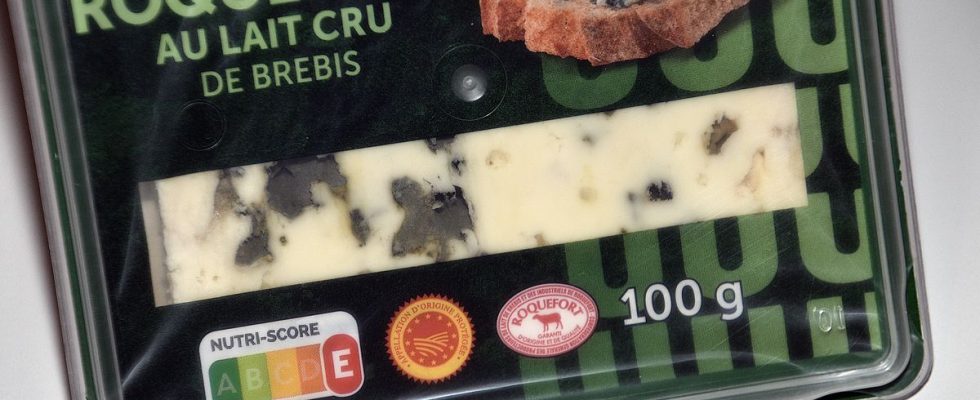A Nutri-Score on the map? This is what the President of the Region would like Occitania Carole Delga (PS), as well as other elected officials and producers who defend the exclusion of PDO (protected designation of origin) and IGP (protected geographical indication) products from this rating. The reason ? Many French labeled products, such as Roquefort or even the famous Agen prunes obtain grades ranging from D to E when sodas or other ultra-processed products come out with pretty A or B. As a reminder, the Nutri-Score is a public health tool that allows you to affix a logo on packaging informing about the nutritional quality of products with grades ranging from A to E.
A rating that makes some people wince, especially regarding the relevance for consumers. “The Nutri-Score does not take nutritional qualities into account. Take the example of Roquefort, it is rich in protein, calcium, micronutrients and unsaturated fatty acids. It is not comparable to an ultra-processed product, ”explains Carole Delga in a Twitter thread after a visit to Aveyron.
“Compare the Incomparable”
Carole Delga also believes that this Nutri-Score does not take into account the reality of consumption of these products: “The algorithm performs its classification based on a fixed portion of 100 g or 100 ml. The cheeses are therefore automatically rated E or D. This does not correspond to the actual consumption of a product such as Roquefort or olive oil”. Indeed, Roquefort is rarely consumed in gargantuan portions.
In short, elected officials and the Regional Food Quality Institute of Occitanie denounce “the fact of comparing the incomparable”. For Pierre Ginebre, director of Irqualim, the Nutri-Score is “a nice tool but it is not well used”. In his eyes, it lacks logic: “To say that olive oil is greasy and therefore must be badly rated, it’s cretin. No one is going to drink a liter of oil like that, for fun. This Nutri-Score is not adapted to the fight for which he thinks he is fighting: junk food. Basic products for eating properly are poorly rated, it’s absurd,” he adds.
Fries rated A, a Roquefort rated E…
Whoever defends the 247 labeled Occitan products believes that the Nutri-Score must attack ultra-processed products and not local and ancestral foods. “It’s too caricatural! We don’t emphasize eating well. Frozen fries have better marks than some local products… Recipes dating from the last century cannot adapt to a barometer like that. In short, we do not mix tea towels and napkins.
“The Nutri-Score is not penalizing”
“The Nutri-Score does not condemn any product”, asserts Serge Hercberg, former president of the National Health Nutrition Program which led to the Nutri-Score. “I regret, as a scientist, that political figures defend the economy rather than public health. It is regrettable to see the copy-paste of lobbies’ arguments against this Nutri-Score resume, ”continues the epidemiologist and nutritionist. “The Nutri-Score is not unfavorable to certain products. That doesn’t mean that you shouldn’t eat it, but that you have to consume it with reason,” he explains. “And of course, as a consumer, you have to give preference to a PDO or PGI product rather than an ultra-processed product. Do not mix everything up. The Nutri-Score reflects the reality of food composition, that’s all. It is not penalizing”, reassures the scientist.
“But we cannot promote an E product. Consumers can, because of a basic color code, turn their backs on good products”, regrets Pierre Ginebre who is afraid like others that these grades play on the economy of the sectors.
“We must not confuse giving information to a consumer who needs it and pointing the finger at a product…”, retorts Serge Hercberg. The battle then takes place between the definition of a healthy product in terms of nutritional value and a product of good quality. A local oil, a PDO cheese or labeled prunes are good quality products but, according to the Nutri-Score, products that should not be consumed in excess so as not to endanger your health. It then comes down to the common sense of consumers: “The good things should not be abused”. A-rated frozen fries are good for nutrition – before bathing in hot oil, of course – but that doesn’t mean they’re good quality.
In the meantime, the Nutri-Score is, in any case, not mandatory. But it could become so, if the European Commission legislates in this direction. When producers of Roquefort or even prunes can do without these notes. Coca-Cola does not deprive itself of it, for example, surprisingly…

